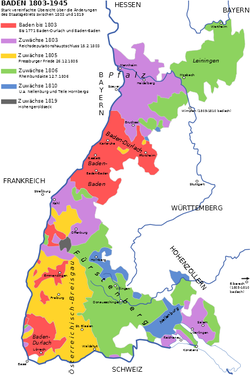Margrave of Baden-Durlach
| Margraviate of Baden | ||||||||||
| Markgrafschaft Baden | ||||||||||
| State of the Holy Roman Empire | ||||||||||
|
||||||||||
|
||||||||||
|
Baden until 1803 (red) and later gains
|
||||||||||
| Capital |
|
|||||||||
| Government | Feudal monarchy | |||||||||
| Margrave of Baden | ||||||||||
| • | 1112–1130 | Herman II | ||||||||
| • | 1250–1268 | Frederick I | ||||||||
| • | 1453–1458 | Bernard II | ||||||||
| • | 1475–1515 | Christopher I | ||||||||
| • | 1771–1803 | Charles Frederick | ||||||||
| History | ||||||||||
| • | Margraviate est. | 1112 | ||||||||
| • | Territory fragmentedb | 1190–1771 | ||||||||
| • | Elevated to Electorate | 1803 | ||||||||
|
||||||||||
| Today part of |
|
|||||||||
| a: Charles Frederick was the Margrave of Baden-Durlach until 1771, when he inherited Baden-Baden and became the Margrave of unified Baden. In 1803, his support of Napoleon rewarded him with the rank of Elector. In 1806, he was raised to the rank of Grand Duke, when he joined the Confederation of the Rhine. b: Baden was fragmented in the years between 1190–1503, 1515–1620 and 1622–1771. |
||||||||||
The Margraviate of Baden (German: Markgrafschaft Baden) was a historical territory of the Holy Roman Empire. Spread along the east side of the Upper Rhine River in southwestern Germany, it was named a margraviate in 1112 and existed until 1803, when it was raised to an electorate. In 1806, the Electorate of Baden, receiving territorial additions, became the Grand Duchy of Baden. The rulers of Baden belonged to the Swabian House of Zähringen.
During the 11th century, the Duchy of Swabia lacked a powerful central authority and was under the control of various comital dynasties, the strongest of them being the House of Hohenstaufen, the House of Welf, the Habsburgs and the House of Zähringen. Emperor Henry III had promised the ducal throne to the Zähringen scion Berthold, however, upon Henry's death in 1056 his widow Agnes of Poitou appointed Rudolf of Rheinfelden Duke of Swabia. Berthold renounced his rights and was compensated with the Duchy of Carinthia and the March of Verona in Italy. Not able to establish himself, he finally lost both territories, when he was deposed by King Henry IV of Germany during the Investiture Controversy in 1077. Berthold retired to his Swabian home territory, where he died the next year. The Veronese margravial title was nevertheless retained by his eldest son Herman I
...
Wikipedia



